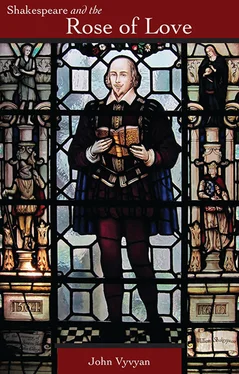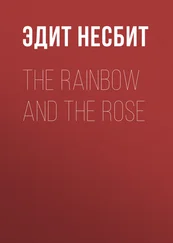The king is still resolved to keep his oath to study. In point of fact, his true education is about to begin, but not in the way he has planned; nor is it in the way we expect, if we are thinking of an éducation sentimentale . *The king is to be instructed in love; but we must beware of putting a present-day construction on that word. Shakespeare is thinking of it, in this context, as many poets of the Middle Ages did – that is, religiously. This is not at once apparent; but it becomes so, when the penances are imposed at the end of the play.
We are being led, here, to the conclusion that learning without love is pedantry; and this may be a first step towards the much greater affirmation of later plays that justice without love is tyranny. In all Shakespeare’s work, love is the star by which his characters must set their course; when they do not, their power and their learning only assist the storm that drives them to disaster. And however lightly Shakespeare seems to be writing, he is illustrating this philosophy.
The king and his lords now visit the princess and her ladies ‘in the field’. His intention is to arrange a quick settlement of the affairs of Aquitaine, which was the purpose of the embassy, and to part; but while he and the princess are discussing business, the lords and ladies are falling for each other. Fortunately, the most important state-document is missing; and as no agreement can be reached without it, the princess must stay. She is to be kept, however, at what seems to be a safe distance; but when the king takes his leave, he makes a slip of the tongue which betrays to the audience how much he is endangered:
You may not come, fair princess, in my gates;
But here without you shall be so received
As you shall deem yourself lodged in my heart,
Though so denied fair harbour in my house…
To-morrow shall we visit you again.
Though debarred from his court, the princess has slipped into his heart; and her ladies have been equally successful with his book-mates. The young men are now all in love. They are ashamed of being so, and are at great pains to hide the fact from one another. But theirs is still a very light kind of love – not nearly good enough for Shakespeare or his heroines. The men are looking down on this divine quality, and Shakespeare is determined that they – like all his characters, except those he has doomed – shall look up to it. They have now reached the stage of sighs and sonnets, which is all very well for a while; but they are by no means ready for the sacrifices that real love entails.
In the brief third act, Berowne is the first to give himself away to the audience; but he commits the much greater indiscretion of making Costard, the rustic clown, his postman. He gives Costard a shilling, and a letter to be delivered to one of the princess’s ladies, Rosaline:
… ask for her,
And to her white hand see thou do commend
This seal’d-up counsel.
Costard has another letter to deliver, and being unable to read, he gives them to the wrong people, with the consequence that Berowne’s love-letter finds its way, in the next act, to the king. This seal’d-up counsel concludes with the couplet:
Celestial as thou art, O, pardon love this wrong,
That sings heaven’s praise with such an earthly tongue.
An earthly tongue would have been pardonable enough, but what is not to be excused is an insincere one. Berowne does indeed suppose himself to be in love; but his true opinion of Rosaline is that she is anything but celestial; and he has no sooner dispatched Costard with the letter, which purports to sing heaven’s praises, than he discloses his opinion to us, in a soliloquy of the utmost candour:
What! I love! I sue! I seek a wife!
A woman, that is like a German clock,
Still a-repairing, ever out of frame,
And never going aright…
Which is she, a celestial being or a German clock? We may form an opinion later; in the meantime, it is certain that Berowne is a hypocrite, and his love-letter a composition of vanity. But his education, like the king’s, is in progress, and part of it is gradually to discover these unflattering facts. His next soliloquy shows some advance:
Well, I do nothing in the world but lie, and lie in my throat. By heaven, I do love: and it hath taught me to rhyme, and to be melancholy… Well, she hath one o’ my sonnets already; the clown bore it, the fool sent it, and the lady hath it: sweet clown, sweeter fool, sweetest lady!
In fact, the lady has not got it; and it will shortly be returned by the clown to the fool, to prick the bubble of his deception; but before that happens, he will have the consolation of finding himself in good company.
The scene which follows is a parody of the ridiculous convention – one more inheritance from Roman comedy – of a number of characters being on stage together, and not merely failing to see one another, but declaiming their secrets aloud. Shakespeare himself was no realist in the theatre; he makes serious use of asides, soliloquies, allegory and more; but it is likely that he laughed at this convention of Terence, and here, in one of his moods of mockery, he shows it as preposterous.
The king enters, with a paper. Berowne steps behind a bush. The king heaves a sigh, and Berowne, delighted, murmurs, ‘Shot, by heaven! Proceed, sweet Cupid…’ The king does proceed, reading aloud a sonnet he has composed to the princess. Only a little less unearthly than Berowne’s, it ends with the couplet:
O queen of queens! how far dost thou excel,
No thought can think, nor tongue of mortal tell.
This he drops, in the simple hope that she will pick it up. Then he too hears a step, and hides behind a second bush. Longaville enters, with a paper, and the king whispers, ‘In love, I hope…’ He is not disappointed. Longaville recites a sonnet he has written to Maria, in which he exonerates himself from oath-breaking on the grounds:
A woman I forswore; but I will prove,
Thou being a goddess, I forswore not thee;
My vow was earthly, thou a heavenly love;
Thy grace being gain’d cures all disgrace in me.
Berowne mutters a sardonic aside:
This is the liver-vein, which makes flesh a deity,
A green goose a goddess: pure, pure idolatry.
So now a green goose has joined the German clock. And Berowne is still ‘much out o’ the way’. Adding a sneer to an affectation has not brought him nearer to the truth; for there is a deity, we shall find, and it is through the earthly love that the heavenly will be discovered. Once more, a step is heard. Longaville hides; and the third lord, Dumain, enters moaning, ‘O, most divine Kate!’ After this, they expose each other; but Berowne, the biggest humbug of them all, comes out last:
Now step I forth to whip hypocrisy.
There is no one, he supposes, who can show him up; and so he flays his fellow-sinners without mercy:
I am betray’d, by keeping company
With men like you, men of inconstancy.
When shall you see me write a thing in rhyme?
Or groan for love? or spend a minute’s time
In pruning me? When shall you hear that I
Will praise a hand, a foot, a face, an eye,
A gait, a state, a brow, a breast, a waist,
A leg, a limb?
The contriving of such situations – where the accuser is guilty of the offence for which he condemns others – is one of Shakespeare’s favourite devices, which he never ceases to use. In comedy, we may call it a trick. But when we find it in tragedy, employed with deep seriousness, we must surely lift it to the status of a principle. Berowne’s own reference to the ‘mote’ and the ‘beam’ shows that even here, in Shakespeare’s mind, it is related to deeper things; even in this seemingly frivolous context, he is beginning to ponder the nature of justice; and the problem, which is inseparable from his enquiry into the nature of love, becomes one of the great preoccupations of his maturity. If the judge is morally no better than the person he condemns, and often – as in Measure for Measure and The Winter’s Tale – worse, then where is justice? There is no light answer to this question; and Shakespeare wrestles with it in his major work, to come, as I think, to a momentous conclusion. It would be astonishing to find the beginnings of it – together with the temptation theme, and other of his basic concepts shortly to be displayed – in comedy, if we had not already been alerted to the fact that he is seeking, among so many other things, an ideal dramatic structure adaptable to every need.
Читать дальше











